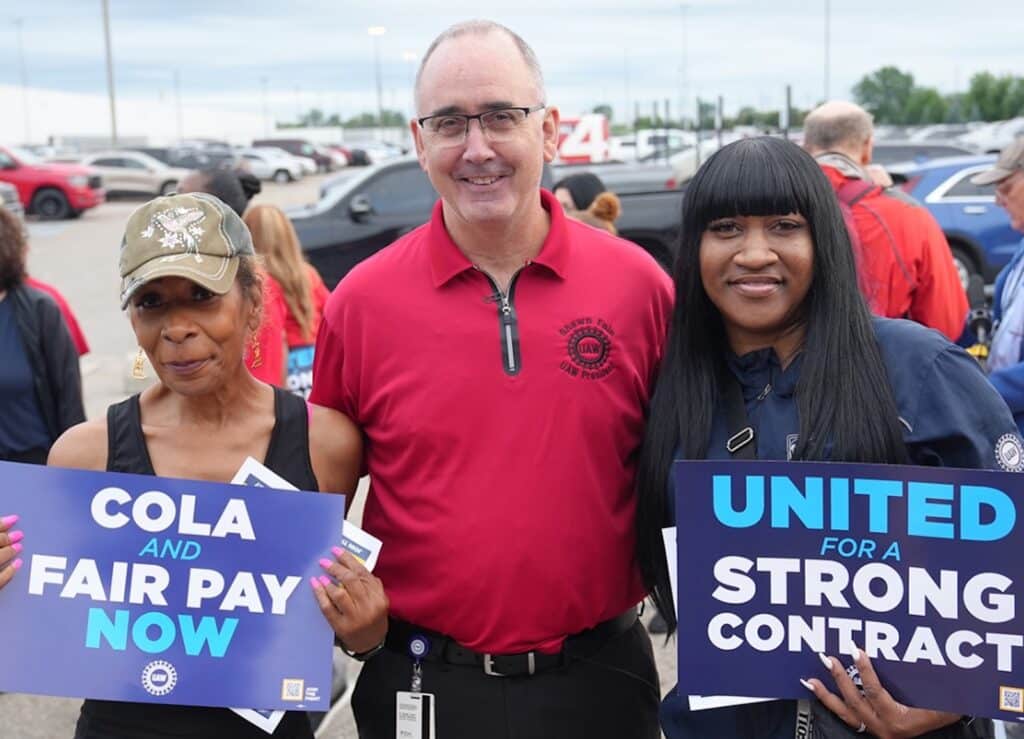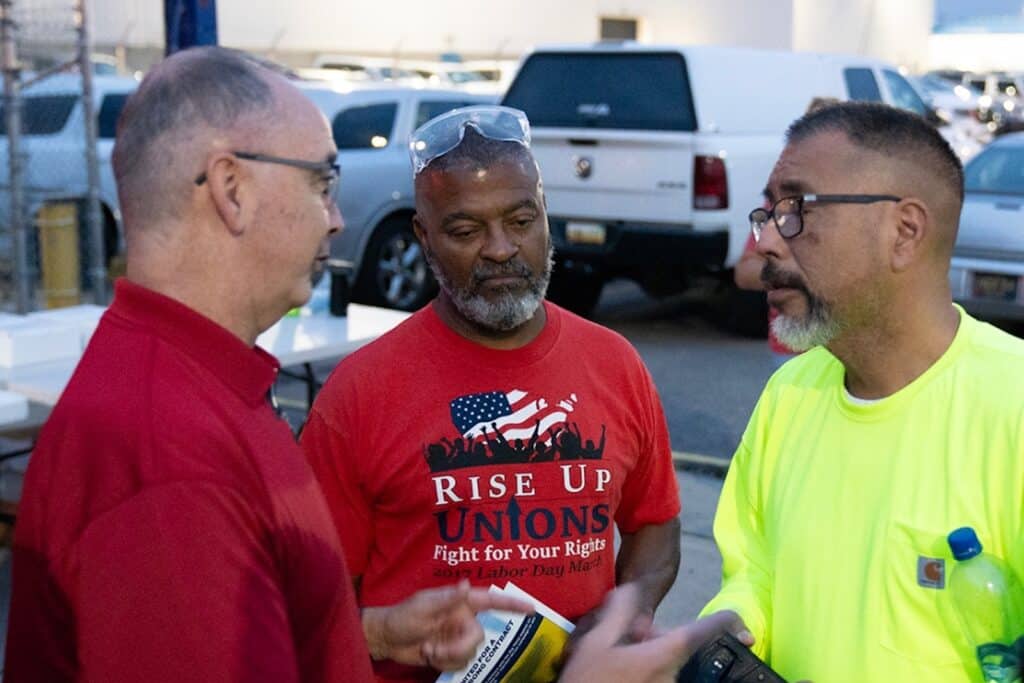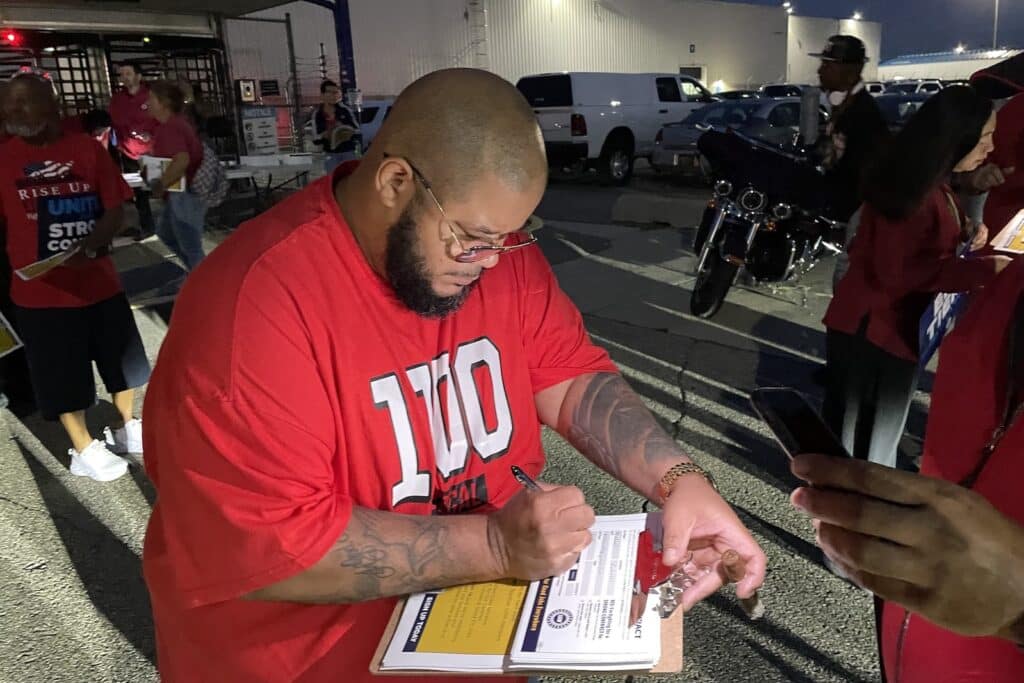UAW Contract Talks Begin with Detroit’s Automakers Without Usual Fanfare
The United Auto Workers is launching a campaign preparing for a confrontation with Detroit’s automakers this fall by asking members to sign pledge cards, stating they support the union demands for ending tiered wages, cost-of-living protection, and pension improvements.

New UAW President Shawn Fain, during a Facebook live appearance prior to the official kick of the negotiations, said the union plans to update union members on the talks and build public support for a possible strike by redefining key issues around the bargaining. For too long, the talks have been defined by the companies, Fain said.
The UAW was quick to respond to a quote from Ford CEO Jim Farley, saying UAW members at Ford made, on average, $112,000 last year. The figure was labeled as misleading because it includes the cost of company paid healthcare and payroll taxes.
A militant stand
“If the Big Three don’t give us our fair share, then they are choosing to strike themselves,” said Fain, who has framed the talks as a way for union members to recover some of the economic ground they’ve lost during the past two decades. He also noted Detroit’s three automakers are made a quarter trillion dollars in profits since the end of the “Great Recession.”
Holding up the bold headline from a Detroit Free Press from 2003, stating “Pacts Help Carmakers Fight Foreign Rivals,” Fain said for years the UAW has touted “company unionism,” which deflated the spirt of union members and led to concessions. The concessions in 2003, included giving Detroit’s three automakers the right to close 10 different plants.
The union’s goal this year is not only to push home its demands, but also to “change the culture of the union” and make it into a fighting institution, said Fain, who cited civil rights leader Malcom X and the union’s own history to make his point.

Fain narrowly won a contentious campaign to lead a divided union. Fain won by only 400 votes and inherited a union structure dominated by one-party rule for more than 70 years.
As an outsider, he also faced the task of reorganizing the union’s staff, removing holdovers from the outgoing Curry administration, and remaining vigilant against the corruption that sent a dozen UAW officers, including two past presidents, to prison.
During the union’s bargaining convention in March, the divisions weakened the tough approach to bargaining, which had been a key element of Fain’s appeal to union members during his campaign for the UAW presidency.
Fain holds key cards
Fain also appears to have a somewhat stronger hand than recent history might suggest.
In 2021, the UAW, pushed by a militant strike that began after union members voted down the initial contract proposal, did win pension improvements and a restoration of cost-of-living protection in negotiations with John Deere.
Earlier this month UPS offered the Teamsters Union a contract package, which included the elimination of a tiered wage system. The UPS-Teamsters negotiations are not finished, but Fain has said he is watching them closely and offering support to Teamster leadership.

Fain also has been paying attention to the changes in the composition of the union’s membership.
The union’s earlier concessions were also designed to protect the pensions and healthcare of an older generation of workers. But the plants at all three automakers are quickly filling up with a new generation of workers, who have slimmed down healthcare and no pensions, Fain has noted.
Many of the new workers, including many of the “temps” employed by Ford, GM and Stellantis work for $16.50 an hour, which Fain has described as “poverty wages” that leave them with inadequate shelter and support for their families.
With 64 days to go before the union’s labor contracts with Ford, General Motors and Stellantis, covering 150,000 blue-collar workers the United Auto Workers is scrapping convention as it opens negotiations in Detroit.
During his Facebook live appearance prior to the official to the official opening today, Fain said he planned to appear at the gates of the automakers’ plants around Detroit, including the Stellantis Truck plant in suburban Sterling Heights, GM’s Factory Zero in Detroit and Ford’s Michigan Assembly plant in Wayne, Michigan rather than participate in the ceremonial handshake with company executives.
The handshake dates to the 1950s, the customary ceremony had become of symbol of the lopsided bargaining that left newly hired autoworkers without cost-of-living protection, pensions, and long grow-in periods before reaching full pay.
Dispensing with the handshake also lets the management of all three companies know they are dealing with a different union, Fain contends.
Auto Lovers Land
Comments
Post a Comment